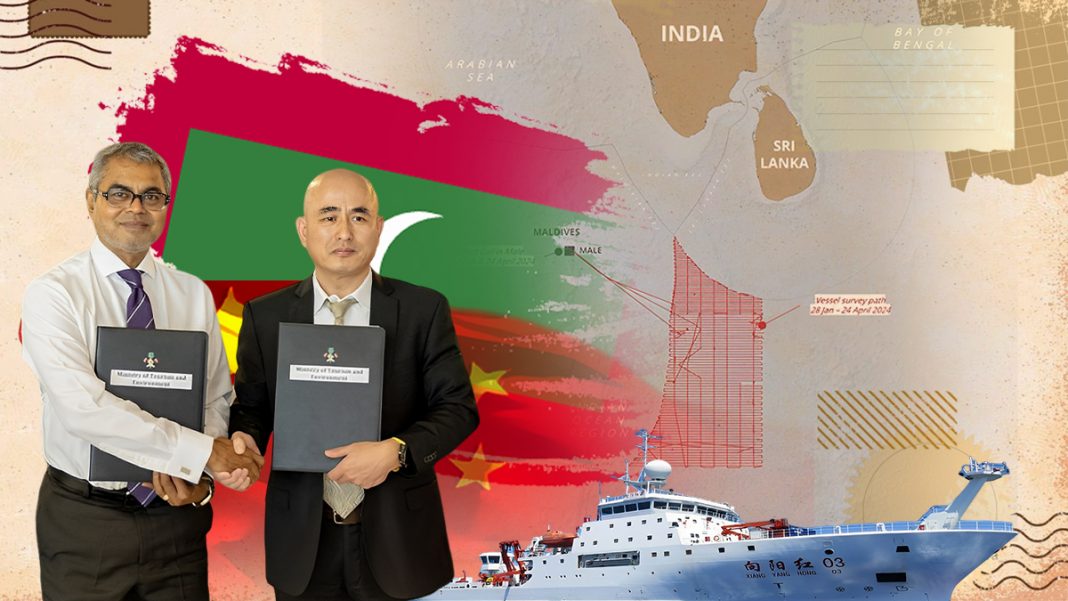A new agreement signed this week between the Environmental Protection Agency (EPA) of Maldives and China’s South China Sea Institute of Oceanology has raised serious concerns, according to Adhadhu. The deal, finalized on Monday and signed by Tourism and Environment Minister Thoriq Ibrahim, allows China to place devices in Maldivian waters to collect data. The government called it a step toward technology cooperation but offered few specifics, leaving many worried it could be a cover for spying on the region.
Three sources who reviewed the agreement spoke to Adhadhu, pointing out the broad access it gives China. They explained that these devices can measure wind, ocean currents, temperature, salinity, and even underwater sounds. One source, speaking anonymously due to the issue’s sensitivity, said, “These tools can pick up noises from ships, submarines, and aircraft—everything moving in or above the water.” This has sparked fears that China might use the setup to gather intelligence.
An expert on Maldives and regional security warned that China could be aiming to monitor its rivals in nearby nations through this arrangement. “China has faced accusations of using technology to spy in other countries. Allowing this in Maldives could lead to serious problems,” the expert said, also requesting anonymity. They predict tension with neighboring countries as a result.
China’s Track Record
Examples like Sri Lanka, where China took control of Hambantota Port after unpaid loans, highlight a pattern—seen as a strategic grab near key shipping routes. In Zambia, Chinese-funded roads and dams led to debt defaults, handing power stations to China. Experts label this a “debt trap,” where China finances projects that fail, then claims assets when debts mount.
In February 2024, the Chinese research ship Xiang Yang Hong 03 spent nearly a month in Maldivian waters, docking near Thilafushi island. Suspicions arose that it was mapping the ocean floor and collecting military data, not just conducting science. Neighboring nations raised concerns, fearing it was tracking their naval movements.
Debt and Underperforming Projects
Maldives owes China around $1.5 billion—a heavy burden for a small nation. The $200 million China-Maldives Friendship Bridge, linking Malé to Hulhumalé, was completed during former President Abdulla Yameen’s tenure but hasn’t delivered the promised tourism or trade surge. The Velana International Airport expansion, another Chinese-funded project, saw costs balloon, making repayment a struggle. These cases fuel worries of a debt trap mirroring Sri Lanka or Zambia.
Policy Reversal and New Deals
President Mohamed Muizzu once opposed foreign nations mapping Maldivian waters. On December 16, 2023, he ended a hydrography deal with a neighboring country, stating, “It’s the responsibility of Maldives to understand its own ocean, not others.” In October 2023, he vowed to keep Maldives neutral in regional rivalries, saying, “This country is too small to get tangled in such a global power struggle.” Yet, his actions suggest a shift. During his first official visit to China in January 2024, Muizzu signed 20 key agreements with Chinese President Xi Jinping, including a defense deal, elevating bilateral ties to a comprehensive strategic cooperative partnership. When journalists pressed for details on the defense agreement, the government denied disclosure, heightening suspicions about its scope.
Risks Ahead
If China uses these devices for spying, it could strain ties with key regional partners providing aid and security. Other nations might also grow wary. The expert cautioned, “This is a risky step. Maldives shouldn’t be part of this big power game.” With its small size and need for allies, Maldives faces high stakes. The Xiang Yang Hong 03 visit last year and now this agreement cast doubt on China’s intentions—whether it’s about technology or gaining leverage over Maldivian waters.


















